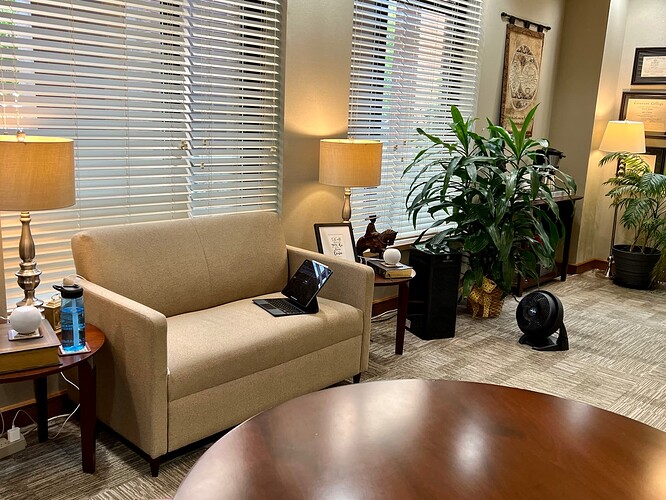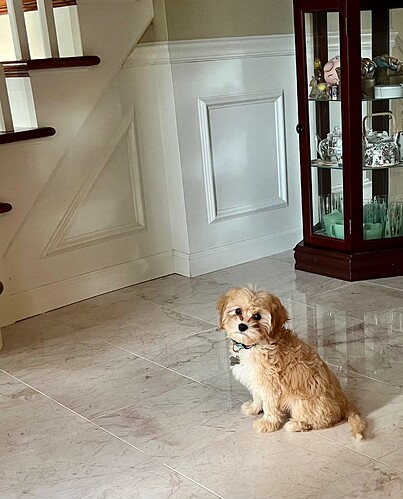I’m the exact opposite. ![]() I do most of my draft long-form writing on the iPad. I use the MBP for cleanup and more complex text work, e.g., creating bibliographies. I find the iPad more pleasurable to use for extended writing sessions, it has fewer distractions, and it is lighter on my lap.
I do most of my draft long-form writing on the iPad. I use the MBP for cleanup and more complex text work, e.g., creating bibliographies. I find the iPad more pleasurable to use for extended writing sessions, it has fewer distractions, and it is lighter on my lap. ![]()
But one of you is in a comfortable chair indoors and one of you is outside up to your elbows in sheep! ![]()
If you’re teaching a large lecture (300 or more students) it’s not unreasonable to prohibit recording the lecture if students do not have dispensation from the disability advocate’s office. It’s your intellectual property (and students have been known to publish lectures without consent to sites that pay them for the content). It’s also often an excuse, if not a reason, for students to pay less attention in class.
Moreover, from my personal experience, recording audio, even using a pen that ties the recording to written notes, is not effective or efficient as a regular practice. Remember that reviewing audio takes place in real time. Recording a specific lecture, or conference talk, may often be effective but you still need permission in the U.S.
Interesting. I tend to get stuck into a mode like writing and very little will distract me other than research on tsomethng I am writing but I’ve learned toput a note in that I need to explain or verify something and move on. I can read on an iPad many places and write like on a tablet if I have a desk to set it on but typing on it, even with the keyboard case, is really difficult for me. I’ve never had it on my lap that I can remember,. But then again even though I have a MacBook Air I’ve never used it as a laptop on my lap but more as a portable development environment. I still set it on a desk and it’s just got a smaller screen than my main iMac but all the same SW (except I don’t use it for calendars or email, that’s iMac only)
For whatever reason, I find it hard to sit at a desk for an extended writing session. I’m more comfortable with the iPad (with a Magic Keyboard) on my lap while sitting in a recliner or a couch. I have a couch in my office where I spend a good bit of time writing and preparing presentations. In fact, I’m writing this response using my iPad on my office couch.
My counseling staff keep recommending that I use the couch for therapy but I’ve resisted! ![]()
Yeah. I had a very advanced math class in junior high where they were running junior high / high school students through standard high school math at college pace, with only one lecture per week. I recorded the lecture and took notes because there was no help available whatsoever if I had questions during the week. But the number of times those recordings were useful in any way was relatively small, and the process of finding what I needed was incredibly inefficient.
I note a startling lack of sheep. ![]()
She is looking a bit sheepishly at you.
—
JJW
That made me laugh!! ![]()
I completed my masters in the UK just before the pandemic and we were required to inform everyone present if we would like to record the lecture or the workshop due to GDPR and the UK’s DPA.
Also, at the masters level, some of the cases and examples discussed may have come from the students’ professional experience and practice (I work in communications/PR). While I am happy to discuss some of the cases and clients I worked with in an educational setting, I am still not happy for this to be recorded.
This is an interesting additional context to consider. Students attending a class may have to accept that they will be recorded under official methods (e.g. Zoom or Panopto). They could however retain a right to have to opt in via formal approval to be recorded by any other method (e.g. someone’s personal audio/video recorder).
In short, before you venture to take a personal audio recording during a class lecture, you should determine whether you will violate any restrictions set by the university, the instructor, or even the individual students in the class.
As a side note, some states in the US allow audio recordings of conversations with only the knowledge of one party in the conversation. Unfortunately, this open restriction has had a consequence that students thereby felt at liberty not only to record a conversation with a faculty but also to post or threaten to post the recording publicly, ostensibly as a way to intimidate the faculty for something stated, e.g. perhaps in a professional but bluntly negative manner.
—
JJW
@DrJJWMac and @svsmailus, I suspect some faculty might also see such a prohibition as reducing the risk of being taken out of context and ending up on some site like the Professor Watchlist.
Exactly … Even as I added by an addendum as you replied.
—
JJW
What has it all come to! So sad that we cannot simply trust one another.
I will of course seek permission to record. I do find it helpful however to listen to something more than once. With today’s technology it would be so helpful to listen to a lesson again whilst out for a walk or to focus on something you didn’t quite hear at the time.
My thoughts …
-
People choose by their own volition and demonstrate commensurately by their actions whether they are worthy to be designated as trustworthy or untrustworthy.
-
Trust is thereby a valuable coin that others earn from us. It is not a token that we “simply” hand out, especially not as though it has magic powers to make the world a better place.
-
The world has never been one where we can simply trust one another implicitly or without due consideration. Nor will it ever be.
All said, surprise and sadness have no real place here. And the adage “An ounce of prevention is worth a pound of cure” applies at its best. Thus the restriction on personal recording of lectures.
Welcome to Life 101.
–
JJW
“Trust everybody, but cut the cards” -Finley Peter Dunne (1867-1936)

